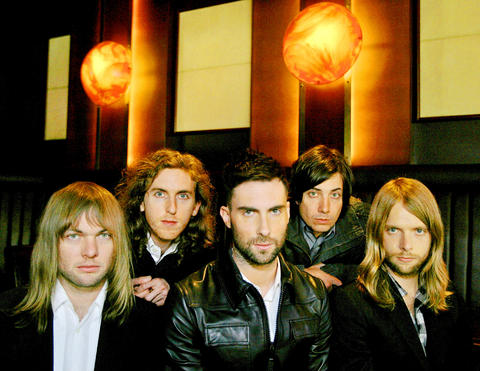It is possible to pinpoint the moment where everything hits Adam Levine. During one of their best-known songs, She Will Be Loved, the singer, guitarist and principal songwriter in Maroon 5 allows his emotions to the surface. Performing in front of a sell-out crowd at the Staples Center in the band's home city of Los Angeles, Maroon 5 pause the song. A close-up of Levine's face flashes on to the screens that flank the stage: is that a tear in what many suppose to be his gimlet eye?
"I almost did [cry]," Levine admits the following day, as he, bassist Mickey Madden and guitarist James Valentine chat over an organic meal in the bowels of San Diego's Cox Arena, another colossal sports venue the band have sold out. "I was just taking it all in. We always do that pause, but this was a very intense one." "More or less all the people involved in the making of our record were there, and our friends and families," Madden explains of the Los Angeles show. "All of the people that you wanna impress the most, the kind of people who, when you think about it, can really trip you up, or really make you play better."
This tour's emphatic success has been the long-awaited reward for one of the most misunderstood and unfairly maligned pop bands of recent years. Maroon 5's debut album, Songs About Jane, sold more than 10 million copies worldwide. The follow-up, It Won't Be Soon Before Long, released in May, is closing in on 3 million sales already.

POPULISTS OR CHARLATANS?
Yet the band's rise has hardly been the serene, untroubled one such bald statistics suggest. Songs About Jane - originally released in 2002 - was the ultimate "sleeper" hit, turned into a huge success by relentless, unforgiving touring. The bonds between the core members - Levine, Madden, keyboardist Jesse Carmichael and drummer Ryan Dusick, all of whom had been friends since their early teens - were put to the test when an injury forced Dusick out of the group. Add to this a critical reception that paints them as at best opportunists, at worst cynical charlatans, and there seem plenty of good reasons for Levine and his bandmates to get emotional.
UK critics view the band with suspicion tending to derision. NME, Uncut and Mojo - magazines with clear ideas about what their readers judge to be serious rock music - did not review It Won't Be Soon.

PHOTO: AP
The Guardian's review of a gig in London this year said: "They have clung to the perspective that adequate is preferable to amazing, and competence is enough to fill the charisma void."
It is difficult to see what Maroon 5 have done to attract such opprobrium. They are clearly serious about music: despite Noel Gallagher slagging them off when Maroon 5 and Oasis were paired on a UK festival bill, the Angelenos bear no ill will towards the leader of a band they all admire. And as support for this tour of enormous US venues they have chosen critics' darlings the Hives, at least in part, as Valentine explains, "because a lot of our audience is a pop radio-listening audience that might not otherwise be exposed to a band like them."
POP PERFECTION
Songs About Jane was a robust, immaculately crafted collection of pop-rock songs with nods to Stevie Wonder, U2 and Led Zeppelin. It Won't Be Soon transcends it: every verse, chorus and middle-eight has been honed to pop perfection.
"We wanted to make an album full of singles: that kind of was the goal," says Levine, smiling coyly. "Maybe it was a bit of a mistake the first time around, and we wanted to repeat that mistake.
I like having hit singles! It's fun!"
"It's best just to ignore all press, be it good or bad, but it's impossible at the same time," says Madden. "We definitely have a very populist role in the music scene, which I think all of us would prefer, rather than to be a niche band that appeals to music journalists. No one likes to read condescending or dismissive things about themselves, but I think there's a lot more to the band than would meet the eye on a cursory glance, you know?"
He has a point. Much of Maroon 5's US press concentrates on Levine, whose good looks and lyrics of pain and heartbreak have combined with a string of assignations with high-profile women to turn him into prime celebrity-media fodder. His bandmates stop short of admitting frustration with his public image, but Madden concedes, when the singers is out of earshot: "Adam's celebrity is definitely overwhelming. It's distracting and it gets in the way of seeing the band as a band, so, in that sense, it's tiresome." But if Maroon 5 is a democracy - and there is considerable evidence they are - it's a democracy where some group members are more equal than others.
"The vast bulk of the creativity comes from Adam, and that's duly noted in the way we make our decisions," Madden explains. "There's very little ego in our decision-making, particularly artistically, which is great - that's a nice place to aspire to, and get to. I think the principal reasons bands fall apart and end up hating each other are just pure questions of ego, jockeying for attention. But I think we all know the roles we play within the band."
The tour ends the day after our interview with a more intimate gig at the Palms casino in Las Vegas, the set culminating in a 10- minute cover of Prince's Purple Rain. Afterwards, the band head to a club for an end-of-tour party; all except Levine, a keen blackjack player, who is given the full Vegas high-roller treatment and spends the night gambling in a roped-off VIP area.
It's not that he isn't one of the gang - he is a prime mover in the end-of-tour joke played on the Hives, who are ambushed on stage by a balaclava-clad Maroon 5 who spray them with silly string - but perhaps the comparative elevation of his personal celebrity has combined with the parts of his personality that lean towards the loner, and has exaggerated his status as first among equals. In any case, his school friend argues, Levine was always a star in his own mind; it's just now that everyone else is catching up.
"Ever since he was 12, I'd say, pretty firmly, that he hasn't basically changed," Madden says. "I would maybe say that fame has justified his personality." Valentine adds: "Having been around lots of successful artists over the years, there's a psychological profile that Adam shares with a lot of them. I wouldn't wanna name names," he chuckles, "but the front-person, the lead singer - it's a very distinct type. You see it again and again."
Who could he mean? Maroon 5 played four dates on the last Rolling Stones tour, and were invited to meet each band member individually in their separate dressing rooms - "They did not disappoint," Madden grins - and one date on the Police tour. Surely Valentine is not invoking Mick Jagger or Sting? "And of course there's the yoga thing," the guitarist says with a smile. (Levine is a recent convert and has brought his teacher on the road.) "But, you know, there's a confidence, and there's never questioning what you do, and diving 100 percent into every decision you make."
GOOD TIMING
But even as headstrong a spirit as Levine's occasionally takes the sensible route. Such as when the band decided not to play their new single, Won't Go Home Without You, when supporting the Police, because of its obvious debt to Every Breath You Take. "Sting went into our dressing room and slapped me in the face," Levine jokes. "Seriously, though, [Every Breath] is one of my favorite songs ever written. I wanted to write a song like it. There was no way it wasn't a direct influence."
"When Adam first brought the song to the band," says Valentine, "it was like the Beach Boys meets the Strokes, because of the way the guitars were arranged. It's still like that in the chorus, but the turn came when we were recording it, and we came across that muted part in the verse. We were like, 'Should we do that?' And we decided, 'It's fine - it's an homage to one of our favorite bands."
"The song would not have turned out the way that it did had they gotten back together before we made the album," Levine explains. "They were totally dead and gone, and were never going to get back together. And they announced their tour a week after our album came out. It would have been silly to play it." Madden sighs. "It would have been like us saying, 'Hey, have you guys ever heard the Police?'"

In the next few months tough decisions will need to be made by the Taiwan People’s Party (TPP) and their pan-blue allies in the Chinese Nationalist Party (KMT). It will reveal just how real their alliance is with actual power at stake. Party founder Ko Wen-je (柯文哲) faced these tough questions, which we explored in part one of this series, “Ko Wen-je, the KMT’s prickly ally,” (Aug. 16, page 12). Ko was open to cooperation, but on his terms. He openly fretted about being “swallowed up” by the KMT, and was keenly aware of the experience of the People’s First Party

Aug. 25 to Aug. 31 Although Mr. Lin (林) had been married to his Japanese wife for a decade, their union was never legally recognized — and even their daughter was officially deemed illegitimate. During the first half of Japanese rule in Taiwan, only marriages between Japanese men and Taiwanese women were valid, unless the Taiwanese husband formally joined a Japanese household. In 1920, Lin took his frustrations directly to the Ministry of Home Affairs: “Since Japan took possession of Taiwan, we have obeyed the government’s directives and committed ourselves to breaking old Qing-era customs. Yet ... our marriages remain unrecognized,

Not long into Mistress Dispeller, a quietly jaw-dropping new documentary from director Elizabeth Lo, the film’s eponymous character lays out her thesis for ridding marriages of troublesome extra lovers. “When someone becomes a mistress,” she says, “it’s because they feel they don’t deserve complete love. She’s the one who needs our help the most.” Wang Zhenxi, a mistress dispeller based in north-central China’s Henan province, is one of a growing number of self-styled professionals who earn a living by intervening in people’s marriages — to “dispel” them of intruders. “I was looking for a love story set in China,” says Lo,

During the Metal Ages, prior to the arrival of the Dutch and Chinese, a great shift took place in indigenous material culture. Glass and agate beads, introduced after 400BC, completely replaced Taiwanese nephrite (jade) as the ornamental materials of choice, anthropologist Liu Jiun-Yu (劉俊昱) of the University of Washington wrote in a 2023 article. He added of the island’s modern indigenous peoples: “They are the descendants of prehistoric Formosans but have no nephrite-using cultures.” Moderns squint at that dynamic era of trade and cultural change through the mutually supporting lenses of later settler-colonialism and imperial power, which treated the indigenous as